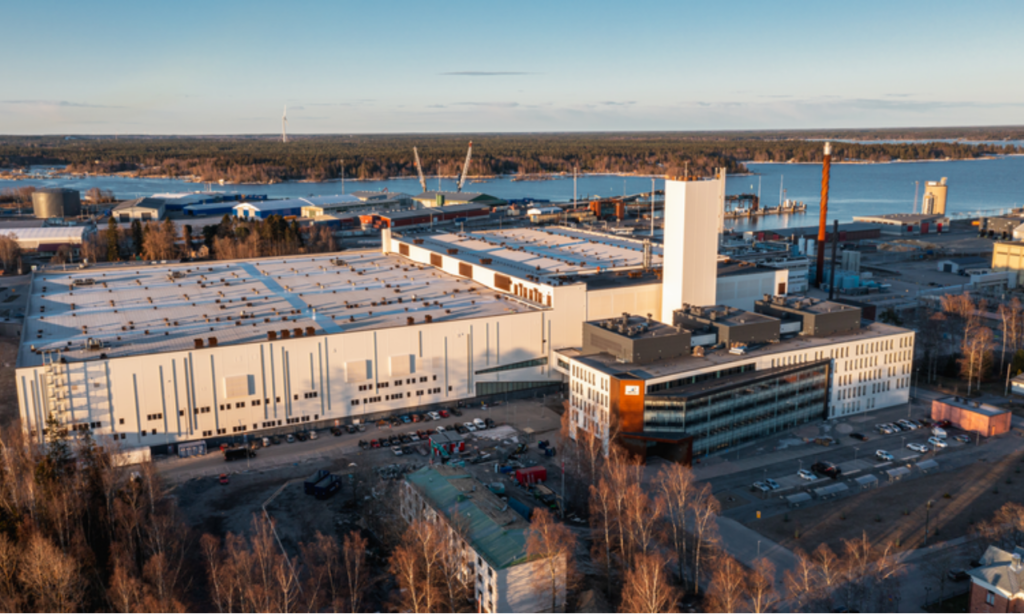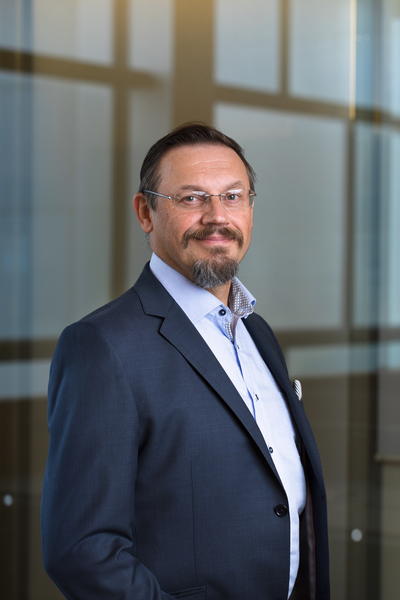
Wärtsilä's ammonia engine in laboratory. Photo: Christoffer Björklund
14 Aug 2024
How Wärtsilä is decarbonising the shipping industry for 2050
The shipping industry is steering towards net-zero greenhouse gas emissions by 2050. With ships sailing for 25 to 30 years on average, any ship built today must be ready to navigate tomorrow’s environmental challenges. At the forefront of this transition is Wärtsilä, a global leader in maritime and energy technologies. We visited their Sustainable Technology Hub in Vaasa, Finland to see their innovations first-hand.
Wärtsilä’s R&D efforts are concentrated in Europe, with the Sustainable Technology Hub in Vaasa serving as the epicentre. The Hub is impressive—after all, it is intended for 2,000 people, of whom around 700 work on research and development. You feel like a little jigsaw puzzle piece in there. It opened just two years ago and features a fuel laboratory, engine and technology testing facilities, and a highly automated production system.
When we were there, we spoke with Wärtsilä’s Chief Technology Officer Juha Kytölä about the future of the shipping industry, about how engines will need to be adapted to different types of fuels during the next 25 years, and Wärtsilä’s role in making all this possible—which answers the question about why the Hub has a fuel laboratory—sustainable shipping begins with sustainable fuel.
The company is investing heavily in R&D to develop cleaner, more sustainable engines that can utilise more sustainable fuels.
“Last year, we budgeted 260 million euros for our R&D, which is 4.3% of our net sales,” said Kytölä.
As we make it to the engine assembly line, the giant proportions give us the feeling that we’re watching spaceships being assembled. Something crucial for the engines comes from every corner of the grand assembly hall. Everything seems to work as impressively and magically as one would expect at a Santa gift factory. The number of people working here constitutes almost a tenth of Wärtsilä’s global workforce.
NIB is co-financing Wärtsilä’s research and development between 2023 and 2025.

Helping the ships meet the new standards
Wärtsilä’s clients, including Tallink and other major shipping companies operating in the Baltic Sea, are actively seeking ways to reduce their environmental impact. These companies can make substantial progress towards their sustainability goals by adopting new engine technologies.
“Most operators in the Baltic Sea region are our clients,” adds Kytölä. “We not only offer them engines but lifecycle solutions,” says Kytölä.
A 2020 study by the International Maritime Organisation (IMO) found that maritime transport accounted for 2% of global greenhouse gas emissions, comparable to the annual emissions of Japan, a nation of 125 million people. Without intervention, IMO warned that CO2 emissions from shipping could increase by 45% by 2050. To mitigate this, the IMO revised its climate strategy last year, setting the goal of net-zero emissions by 2050. This directive is driving shipowners to invest in sustainable solutions today. Wärtsilä’s role in this plan is to develop technologies that enable ships to meet these new standards.
Kytölä spoke about what the targets and new regulations mean for ship owners.

“When planning to build a ship today, you need to consider that the ship’s lifetime will be until 2050 or even longer. This means they’re already looking for net-zero solutions today.”
Juha Kytölä, the CTO of Wärtsilä
Wärtsilä’s approach to decarbonisation involves a phased innovation in fuel technology, ensuring that today’s investments remain viable in the future. Their roadmap to 2050 begins with biofuels, moves to “blue” fuels, and culminates in the adoption of synthetic green fuels.
Historically, adopting new fuel technologies would have meant making extensive replacements to the existing engine infrastructure or abandoning it completely. Wärtsilä’s take on this is far simpler. The engines they put into ships today will be ready for the new fuels in 2050. “By 2050, fossil fuels will have disappeared from the market,” says Kytölä.
“We’re deeply involved in the green transition, and our strategy focuses on decarbonisation. We’re here to find ways to eliminate the use of fossil fuels,” says Kytölä.
Fuel innovation
Biofuels, which are produced from non-edible crops or natural resources such as wood or agricultural residue, have been used since the mid-2010s, and today, these fuels are already being produced in significant quantities, making them accessible. Although they still emit greenhouse gases, they are less environmentally harmful than fossil fuels.
“Blue” fuels take it a step further. Essentially, they are produced using fossil fuels, capturing and storing the carbon in the fuel production process. These fuels significantly reduce greenhouse gas emissions compared to traditional fossil fuels.
Kytölä says that one of the most promising avenues in marine industry decarbonisation R&D is the development of engines powered by alternative fuels like methanol and ammonia. This includes “blue” ammonia, which is more straightforward to scale than the synthetically produced “green” ammonia introduced in the third and final phase.
Finally, we will transition to the use of green fuels. These fuels are produced from hydrogen through electrolysis, using renewable energy. This means these fuels are produced synthetically.
It is worth noting that all these fuels are available today, but as of now, not all of them are scalable—so Wärtsilä relies on a multi-step roadmap.
Kytölä says that green methanol has emerged as an early leader. Methanol engines are a proven technology, and ships can run on multiple biofuel types using currently available technology, significantly cutting emissions compared to fossil fuels. This makes these advanced fuels a good short-term option that can make an immediate impact.
“We’re supporting the vessels in adopting greener practices throughout their lifecycle.”

